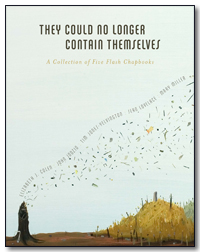
|
Born of an unwillingness to release four finalists from their annual contest into the abyss of rejection, and a desire to keep a previous contest winner in print, They Could No Longer Contain Themselves: A Collection of Five Flash Fiction Chapbooks manifests in each and every story the same big-hearted bullheadedness its road to publication suggests it would. As Abigail Beckel and Kathleen Rooney claim in a prefatory note, these stories “…form a chorus of voices that vibrate with both the desire to break free of the relationships that hold them, hurt them, and define them, and the desire to more deeply entwine themselves into the lives of others….” Five magnetizing chapbooks follow, each unique in their wit, observation, and tact. The frantic realism of John Jodzio’s Do Not Touch Me Not Now Not Ever begins with an odd game of office worker seduction set on warp speed, features a stalker successfully staging his own ascendance to heroism along the way, and ends with “Vessels,” a story as much about a son’s figurative legacy as it is about a father’s literal one. But the best of this bunch might be “Inventory,” a postmodern parable that starts in the real world but grows increasingly surrealistic as it proceeds: “Our baby swallowed a ninja star and then it swallowed a Bakelite button. It seemed fine. Breathing and everything. We checked. We are fine parents.” Eventually, of course, the baby disappears. Literally. Along with our expectations. Elizabeth J. Colen’s stunningly good Dear Monster Mother, Dear Daughter Mistake is truth-in-advertising as its best. Her stories, presented in two sets from alternating points of view, give us the closest thing we’ll get to the whole story in a mother-daughter relationship, including the secrets the two women keep from each other. “Rule of Thirds” begins, “Today my girlfriend and I had sex while a man took pictures in the backyard, I start, in a letter to my mother. This letter is not really intended for her, though when I start I pretend it is.” The mother harbors her own secrets. After a husband dies, she sees a series of therapists, with mixed results underscored by their inappropriateness: “Dr. Stevens didn’t let me fall for him. The first one, the Irish-looking man let me blow him while he stood on his rolling desk chair. Stevens referred me to someone else because I touched his cock through his khakis once when he showed me out.” Tim Jones-Yelvington’s contribution, Evan’s House and the Other Boys Who Live There, offers another tutorial in narrative structure. Each story adds a character to the overall narrative of Evan, and yet each also picks apart the wonderful, if troubled, protagonist. Sean Lovelace’s How Some People Like Their Eggs makes for the most laughs, and he’s especially good at juxtaposing classic elements of American pop culture with the trials of late twentieth and early twenty-first century life. See “Charlie Brown’s Diary: Excerpts” and “Wal-Mart.” But the star of the show, the chapbook I keep coming back to, is Mary Miller’s Paper and Tassels. If Ray Carver and Lydia Davis ever had a secret love affair, Mary Miller would have been the result. In nearly every story, the protagonist and narrator is a reflection of all the other narrators in this chapbook: a beautiful and fragile and bold young woman in close proximity to a man who’s clearly not the best choice for herself, even if he might be the only choice she has. “Misled” begins, “When you tell Paul you love him, he gives you a sad look and says he doesn’t feel the same way. Then he says, ‘This hurts me more than it hurts you,’ and he sits up and slips his jeans on.” A new boyfriend follows, but Paul is always there in the shadows, exerting his control in absentia. There are moments of great understated humor throughout: “Last night I’d gotten drunk because we went to a bar,” one narrator claims. And there’s so much more to this excellently layered collection of contemporary flash fiction. But if you want to know what those things are, you’ll need to buy this book. Otherwise, you’ll miss out on all the tender moments of transcendence: “His sheets smelled like oranges. I held his penis in my hand like a thick rope of sausage. ‘I don’t think it will fit anywhere,’ I said. ‘That’s okay,’ he said. He didn’t say, ‘Let’s try.’ He didn’t say, ‘It will.’ --Jay Robinson Jay Robinson is a Visiting Professor of English at Ashland University. He's also co-editor-in-chief of Barn Owl Review. Poems have appeared or are forthcoming in 32 Poems, Anti, The Laurel Review, and The North American Review, among others.
|
